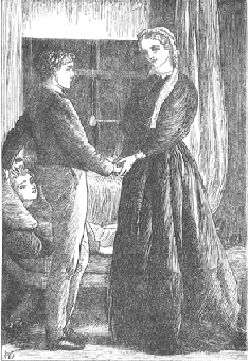“Oh, no, mother, you can’t think how well I feel. I shall start with you to-morrow for Devonshire. But, mother, here’s my friend; here’s Tom Brown—you know him?”

Tom and Arthur’s Mother
“Yes, indeed, I’ve known him for years,” she said, and held out her hand to Tom, who was now standing up behind the sofa. This was Arthur’s mother: tall and slight and fair, with masses of golden hair drawn back from the broad white forehead, and the calm blue eye meeting his so deep and open—the eye that he knew so well, for it was his friend’s over again, and the lovely tender mouth that trembled while he looked—she stood there, a woman of thirty-eight, old enough to be his mother, and one whose face showed the lines which must be written on the faces of good men’s wives and widows—but he thought he had never seen anything so beautiful. He couldn’t help wondering if Arthur’s sisters were like her.
Tom held her hand, and looked on straight in her face; he could neither let it go nor speak.
“Now, Tom,” said Arthur, laughing, “where are your manners? you’ll stare my mother out of countenance.” Tom dropped the little hand with a sigh. “There, sit down, both of you. Here, dearest mother, there’s room here;” and he made a place on the sofa for her. “Tom, you needn’t go; I’m sure you won’t be called up at first lesson.” Tom felt that he would risk being floored at every lesson for the rest of his natural school-life sooner than go; so sat down. “And now,” said Arthur, “I have realized one of the dearest wishes of my life—to see you two together.”
And then he led away the talk to their home in Devonshire, and the red bright earth, and the deep green combes, and the peat streams like cairngorm pebbles, and the wild moor with its high cloudy Tors for a giant background to the picture—till Tom got jealous and stood up for the clear chalk streams, and the emerald water meadows and great elms and willows of the dear old Royal county, as he gloried to call it. And the mother sat on quiet and loving, rejoicing in their life. The quarter-to-ten struck, and the bell rang for bed, before they had well begun their talk, as it seemed.
Then Tom rose with a sigh to go.
“Shall I see you in the morning, Geordie?” said he, as he shook his friend’s hand. “Never mind though; you’ll be back next half, and I shan’t forget the house of Rimmon.”
Arthur’s mother got up and walked with him to the door, and there gave him her hand again, and again his eyes met that deep loving look, which was like a spell upon him. Her voice trembled slightly as she said, “Good night—you are one who knows what our Father has promised to the friend of the widow and the fatherless. May He deal with you as you have dealt with me and mine!”
Tom was quite upset; he mumbled something about owing everything good in him to Geordie—looked in her face again, pressed her hand to his lips, and rushed downstairs to his study, where he sat till old Thomas came kicking at the door, to tell him his allowance would be stopped if he didn’t go off to bed. (It would have been stopped anyhow, but that he was a great favourite with the old gentleman, who loved to come out in the afternoons into the close to Tom’s wicket, and bowl slow twisters to him, and talk of the glories of bygone Surrey heroes, with whom he had played former generations.) So Tom roused himself, and took up his candle to go to bed; and then for the first time was aware of a beautiful new fishing-rod, with old Eton’s mark on it, and a splendidly bound Bible, which lay on his table, on the title-page of which was written—“Tom Brown, from his affectionate and grateful friends, Frances Jane Arthur; George Arthur.”
I leave you all to guess how he slept, and what he dreamt of.
| Previous chapter/page | Back | Home | Email this | Search | Discuss | Bookmark | Next chapter |